
The foreign policy of Denmark is based on its identity as a sovereign state in Europe, the Arctic and the North Atlantic. As such its primary foreign policy focus is on its relations with other nations as a sovereign state compromising the three constituent countries: Denmark, Greenland and the Faroe Islands. Denmark has long had good relations with other nations. It has been involved in coordinating Western assistance to the Baltic states.

Foreign relations of Israel refers to diplomatic and trade relations between Israel and other countries around the world. Israel has diplomatic ties with 164 of the other 192 UN member states as of December 2020. Israel is a member of the United Nations (UN) and a number of other international organisations. Israel maintains full diplomatic relations with two of its Arab neighbours, Egypt and Jordan, after signing peace treaties in 1979 and 1994 respectively. In 2020, Israel signed agreements establishing diplomatic relations with four Arab League countries, Bahrain, the United Arab Emirates, Sudan and Morocco. As of 2021, Israel had formal diplomatic relations with 168 other countries, while twenty-eight UN member states have either never established, or have broken off diplomatic relations with Israel.
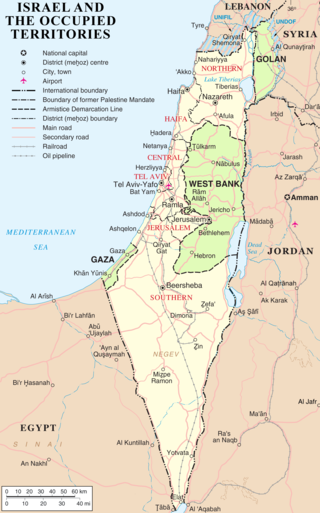
Israel has occupied the Palestinian territories and the Golan Heights since the Six-Day War of 1967. It previously occupied the Sinai Peninsula and southern Lebanon as well. Prior to Israel's victory in the Six-Day War, occupation of the Palestinian territories was split between Egypt and Jordan, with the former having occupied the Gaza Strip and the latter having annexed the West Bank; the Sinai Peninsula and the Golan Heights were under the sovereignty of Egypt and Syria, respectively. The first conjoined usage of the terms "occupied" and "territories" with regard to Israel was in United Nations Security Council Resolution 242, which was drafted in the aftermath of the Six-Day War and called for: "the establishment of a just and lasting peace in the Middle East" to be achieved by "the application of both the following principles: ... Withdrawal of Israeli armed forces from territories occupied in the recent conflict ... Termination of all claims or states of belligerency and respect for and acknowledgment of the sovereignty, territorial integrity and political independence of every State in the area and their right to live in peace within secure and recognized boundaries free from threats or acts of force."

The status of Jerusalem has been described as "one of the most intractable issues in the Israeli–Palestinian conflict" due to the long-running territorial dispute between Israel and the Palestinians, both of which claim it as their capital city. Part of this issue of sovereignty is tied to concerns over access to holy sites in the Abrahamic religions; the current religious environment in Jerusalem is upheld by the "Status Quo" of the former Ottoman Empire. As the Israeli–Palestinian peace process has primarily navigated the option of a two-state solution, one of the largest points of contention has been East Jerusalem, which was part of the Jordanian-annexed West Bank until the beginning of the Israeli occupation in 1967.

Current and historical relations exist between Australia and Denmark. Australia has an embassy in Copenhagen, and Denmark has an embassy in Canberra.

Denmark–Turkey relations are the current and historical relations between Denmark and Turkey. Denmark has an embassy in Ankara, and Turkey has an embassy in Copenhagen. Both countries are members of NATO and Council of Europe. Diplomatic relations between Denmark and Turkey were put under pressure in 2014 because of the Jyllands-Posten Muhammad cartoons controversy and the Roj TV affair (Roj TV's broadcasting license was suspended by the Supreme Court in Denmark on February 27, 2014). Denmark is a member of the European Union, Turkey is not a member.
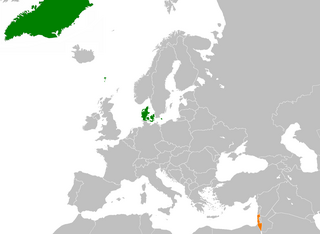
Denmark–Israel relations refers to the bilateral relationship between Denmark and Israel.

Al-Quds Arab Capital of Culture was the name given to Arab Capital of Culture programme in 2009. The programme, organised by UNESCO and the Arab League, is designed to promote Arab culture and encourage cooperation in the Arab world. The 2009 event was the 14th programme since its establishment in 1996.

Fredrik Lundin is a Danish jazz saxophonist, composer and bandleader. Having founded his first jazz quartet in 1981, he has become one of the most expressive saxophonists in Danish jazz and also one of the most prolific ones.
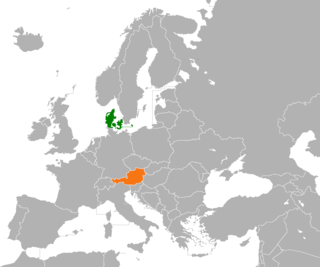
Foreign relations exist between Austria and Denmark. Austria has an embassy in Copenhagen and Denmark has an embassy in Vienna. Both countries are full members of the Council of Europe, of the Organisation for Economic Co-operation and Development, and of the European Union. Diplomatic relations were established on 19 December 1925.

Denmark–Egypt relations are foreign relations between Denmark and Egypt. Denmark has an embassy in Cairo, and consulates in Suez, Port Said and Cairo. Egypt has an embassy in Copenhagen. Both countries are members of the Union for the Mediterranean.

Denmark– Ghana relations refers to the current and historical relations between Denmark and Ghana. Denmark has an embassy in Accra and Ghana has an embassy in Copenhagen. Relations date back to 1660, when Danes settled the Gold Coast. Bilateral relations are described as warm and strong. Denmark has assisted Ghana with development since 1958.

Denmark–Palestine relations refers to the contacts between Denmark and the Palestinian Liberation Organization. Denmark has a representative office in Ramallah. The State of Palestine has a semi diplomatic Mission with the rank of ambassador in Copenhagen. However, Denmark has not recognized Palestine's existence and rights to sovereignty, therefore prohibiting actual relations and has somewhat antagonized the Palestinian Authority at times.

Denmark–Switzerland relations refers to the current and historical relations between Denmark and Switzerland. Denmark has an embassy in Bern. Switzerland has an embassy in Copenhagen, but only offers consular services from the Nordic Regional Consular Centre in Stockholm. Diplomatic relations between Denmark and Switzerland were established in 1945.

Denmark–Sudan relations refers to the current and historical relations between Denmark and Sudan. Denmark is represented in Sudan, through its embassy in Addis Ababa, Ethiopia. Sudan is represented in Denmark, through its embassy in Oslo, Norway.
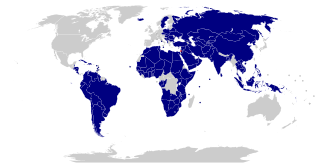
The foreign relations of the State of Palestine have been conducted since the establishment of the Palestine Liberation Organization (PLO) in 1964. Since the Oslo Accords, it seeks to obtain universal recognition for the State of Palestine on the 1967 borders, with East Jerusalem as its capital. As of 2 June 2023, 139 of the 193 United Nations (UN) member states officially recognize the State of Palestine.
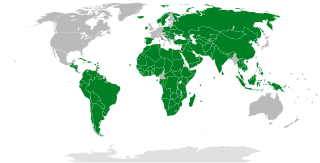
The State of Palestine has been accepted as an observer state of the United Nations General Assembly in November 2012. As of 2 June 2023, 139 of the 193 United Nations (UN) member states have recognized the State of Palestine.
















